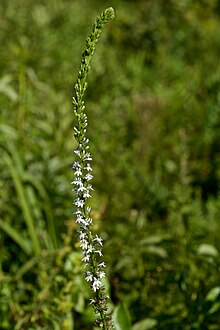| Lobelia spicata | |
|---|---|

| |
|
Scientific classification
| |
| Kingdom: | Plantae |
| Clade: | Tracheophytes |
| Clade: | Angiosperms |
| Clade: | Eudicots |
| Clade: | Asterids |
| Order: | Asterales |
| Family: | Campanulaceae |
| Genus: | Lobelia |
| Species: | L. spicata
|
| Binomial name | |
| Lobelia spicata | |
Lobelia spicata, commonly called the pale spiked lobelia, [2] is a flowering plant in the bellflower family.
It is native to North America, where it is widespread in southern Canada and the eastern United States. [3] It is found in a variety of sunny and semi-shade habitats, including prairies, glades, woodlands, and disturbed areas. [4] Several varieties have been recognized across its range, although their distinction is still uncertain. [4]
It is a short-lived perennial, usually flowering below taller grasses and forbs. It produces a spike of white or pale blue flowers in the summer. [5]
References
- ^ Maiz-Tome, L. (2016). "Lobelia spicata". IUCN Red List of Threatened Species. 2016: e.T64317299A67729992. doi: 10.2305/IUCN.UK.2016-1.RLTS.T64317299A67729992.en. Retrieved 12 November 2021.
- ^ Alan Weakley (2015). "Flora of the Southern and Mid-Atlantic States".
- ^ "Lobelia spicata". County-level distribution map from the North American Plant Atlas (NAPA). Biota of North America Program (BONAP). 2014. Retrieved 11 December 2017.
- ^ a b Yatskievych, George (2006). Flora of Missouri, Volume 2. Missouri Botanical Garden Press. p. 751.
- ^ IllinoisWildflowers
| Lobelia spicata | |
|---|---|

| |
|
Scientific classification
| |
| Kingdom: | Plantae |
| Clade: | Tracheophytes |
| Clade: | Angiosperms |
| Clade: | Eudicots |
| Clade: | Asterids |
| Order: | Asterales |
| Family: | Campanulaceae |
| Genus: | Lobelia |
| Species: | L. spicata
|
| Binomial name | |
| Lobelia spicata | |
Lobelia spicata, commonly called the pale spiked lobelia, [2] is a flowering plant in the bellflower family.
It is native to North America, where it is widespread in southern Canada and the eastern United States. [3] It is found in a variety of sunny and semi-shade habitats, including prairies, glades, woodlands, and disturbed areas. [4] Several varieties have been recognized across its range, although their distinction is still uncertain. [4]
It is a short-lived perennial, usually flowering below taller grasses and forbs. It produces a spike of white or pale blue flowers in the summer. [5]
References
- ^ Maiz-Tome, L. (2016). "Lobelia spicata". IUCN Red List of Threatened Species. 2016: e.T64317299A67729992. doi: 10.2305/IUCN.UK.2016-1.RLTS.T64317299A67729992.en. Retrieved 12 November 2021.
- ^ Alan Weakley (2015). "Flora of the Southern and Mid-Atlantic States".
- ^ "Lobelia spicata". County-level distribution map from the North American Plant Atlas (NAPA). Biota of North America Program (BONAP). 2014. Retrieved 11 December 2017.
- ^ a b Yatskievych, George (2006). Flora of Missouri, Volume 2. Missouri Botanical Garden Press. p. 751.
- ^ IllinoisWildflowers
